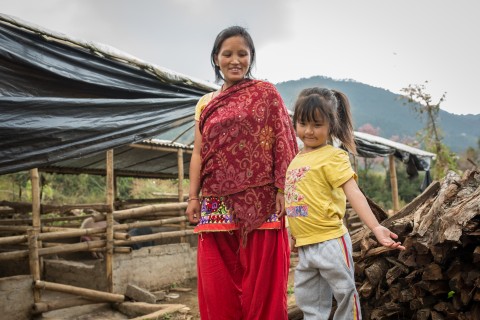Ganga from Nepal is an entrepreneur and a role model
Starting a business always takes courage, maybe even a dose of boldness. For Ganga Tamang it took even more than that.
“My life was very difficult before the arrival of the Women’s Bank cooperative. I had a day job and earned about 80 rupees (approximately 70 cents) a day. The money wasn’t enough for decent clothes or food. I only ate two times a day”, says Nepalese Ganga Tamang, 28 years old.
Securing a livelihood in Tamang’s hometown Bhardeau seemed impossible, and her husband Umesh left for Malaysia to find work only eight months after their wedding.
Soon after that, Women’s Bank presented new income generating opportunities to women in the village. Pig farming is traditionally not considered an appropriate profession for members of the caste of most people in Bhardeau, which means starting a pig farming business required even more daring than usual.
But Ganga Tamang was prepared to break the ancient rules. She was told pig farming is a lucrative business, and she sure needed the income.
Tamang was given a loan by the Women’s Bank and with it she acquired three pigs. She was also trained in how to look after the animals.
“I set up a piggery on our land. I don’t think my husband would have allowed it had he been in Nepal at the time. Back then, many people thought that gods don’t like us farming pigs. It was considered a work of the lower castes”, Ganga Tamang says.
Now Tamang’s piggery is home to 60 sows weighting over 100 kilos each and some piglets.
When Tamang’s husband called after three and a half years abroad to tell her he was coming back home, Tamang became very nervous. What was he going to say about the pigs?
“I didn’t say anything about it to him until the following morning. I told him I had to go feed our pigs.”
Something had changed in her husband during his years abroad.
“He came out to help me with the feeding”, Ganga Tamang says and laughs. “Umesh told me that he had also thought about going into pig farming.”
Ganga and Umesh now work at the piggery together. They also run their small butcher’s shop in the village. As the pigs grow, Umesh sells them in the capital Kathmandu. A 60-kilogramme pig sells for over 100 euros there.

Ganga with 5-year-old daughter Sagun.
“Now we have enough of everything. We are even able to fund Umesh’s little brother’s and sister’s studies. If I need a loan, I can get one easily. Everyone trusts me and knows I will pay back.”
Ganga spends a lot of time outside as evidenced by her tanned skin. She’s wearing pink nail varnish. Before we take photos she changes from her work clothes into a beautiful and colourful Nepalese outfit consisting of a long kurta shirt and baggy pants.
“I have money now, but more than that, the trainings by Women’s Bank have provided me with self-confidence and many practical skills. I am not afraid to speak my mind now.”
Ganga smiles as she says: “Before, I couldn’t even have dreamt of being someone who teaches things to others. Now, other women come to me to learn things. I am a role model for them, because I have been successful with my business.”
“My dream is to give my children a proper education.” Ganga and Umesh have two daughters; 10-year-old Roshani, and 5-year-old Sagun.
The women’s cooperative supported by Women’s Bank has operated in the village of Bhardeau for seven years, and almost all women in the village are members of it. One women’s savings group assembles once a month at Ganga’s house. The cooperative is supporting agriculture, entrepreneurship and education.
Text: Ulla Kärki
Photos: Ville Asikainen